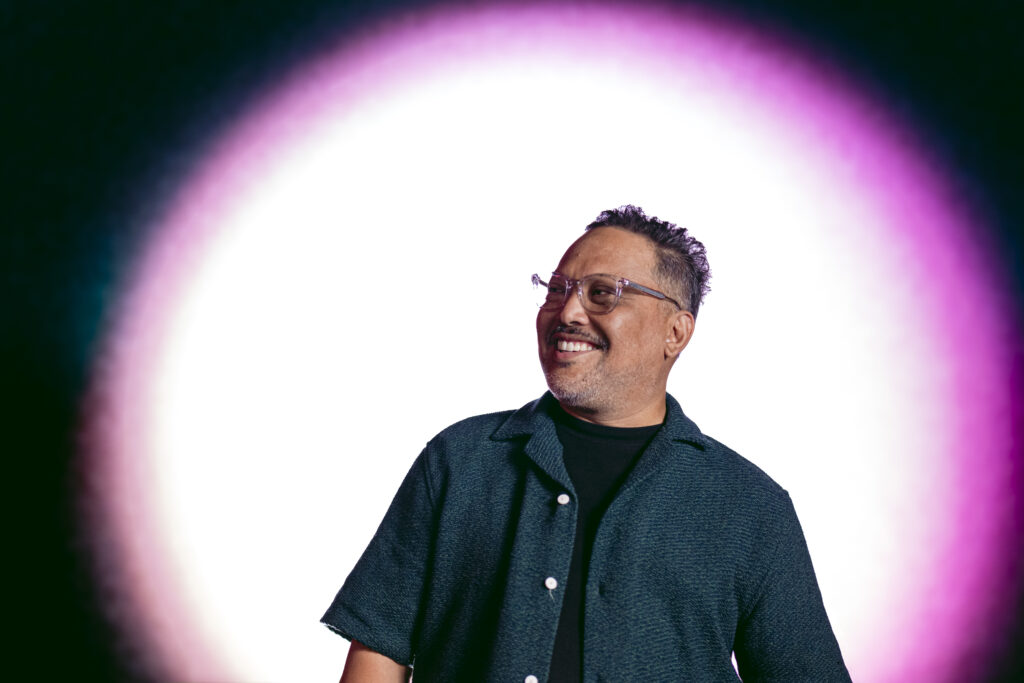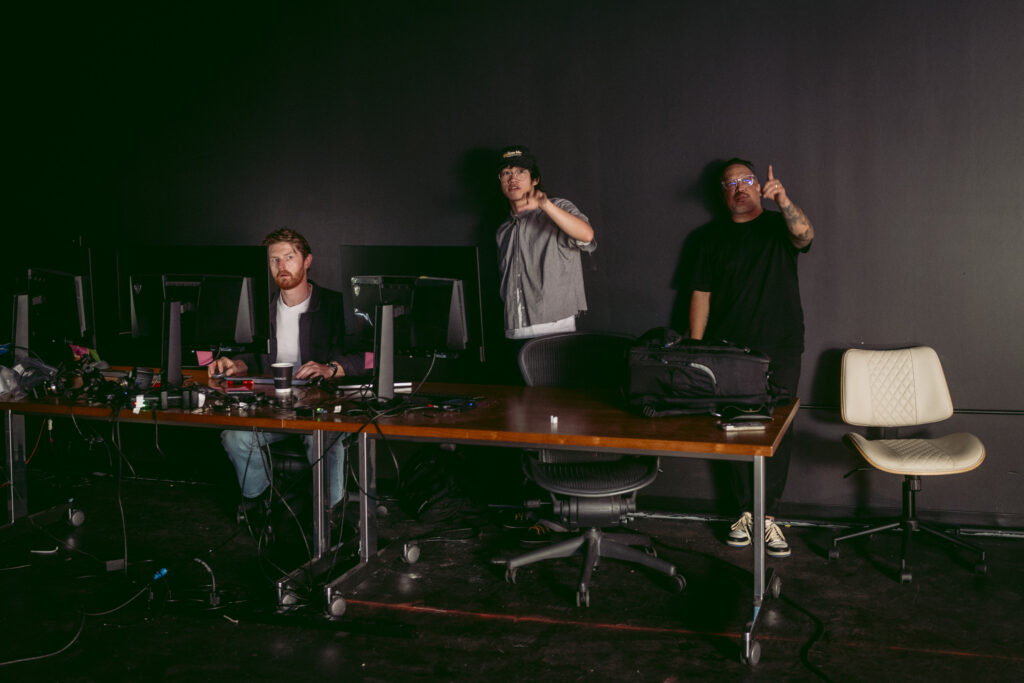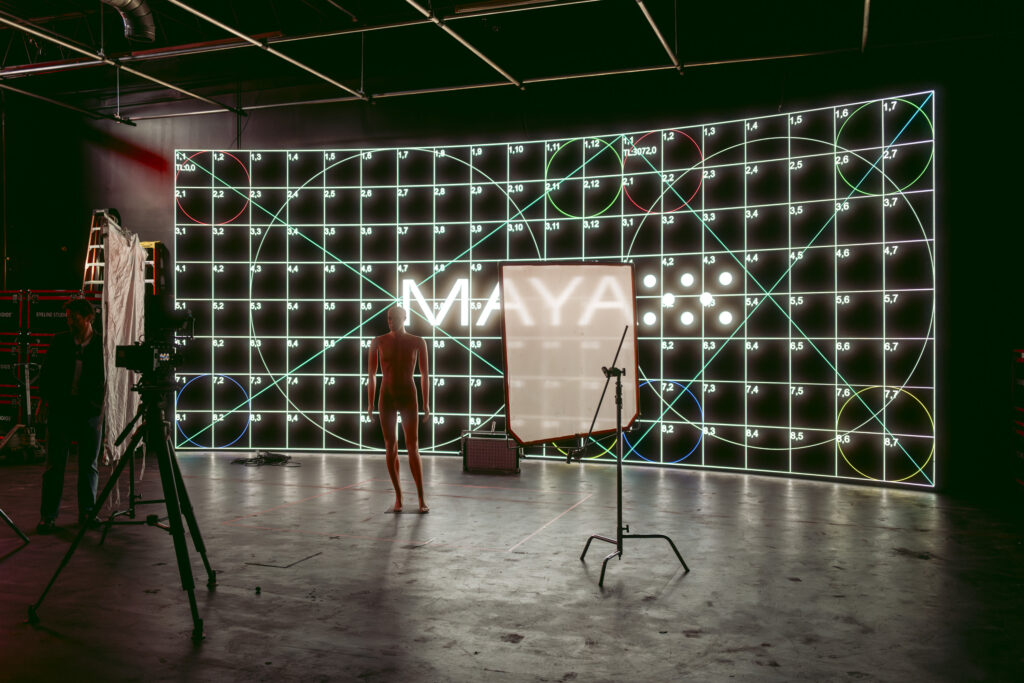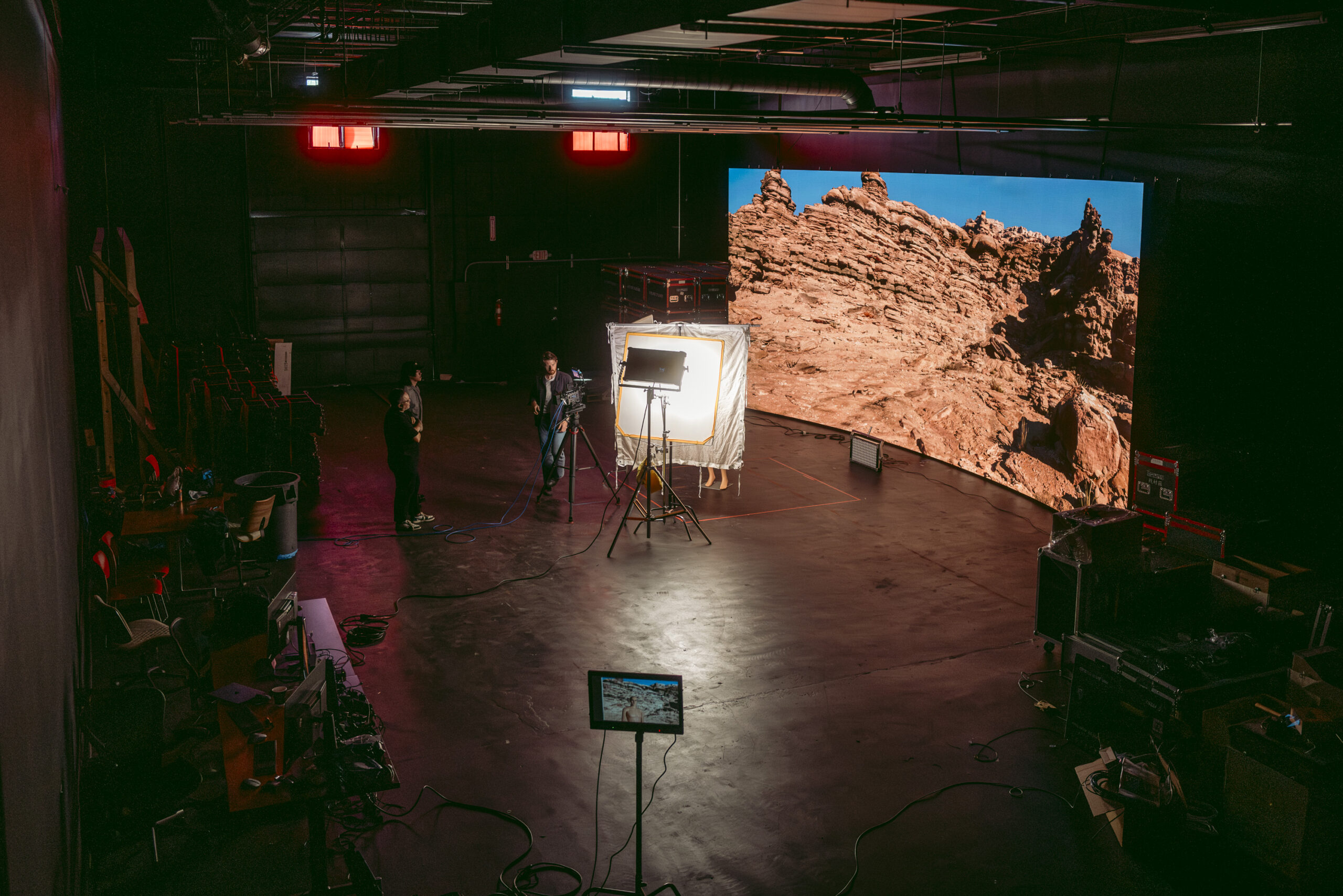The air conditioning wasn’t working yet, and we were to meet in an old warehouse, and it was summer in Charlotte. Hardly an ideal setting to pitch me, a prolific sweat-producer, on a story. Eric Halili wanted to show me his dream anyway.
I met Halili 11 years ago, and he’s baked up dozens of ideas since then — video productions, hand-washing stations, thermometer wristbands. But this, he said, was the big one. (“You have to see it to understand it,” our mutual friend Molly Grantham called to say one morning.) Still I was skeptical, pulling into one of those strips of warehouses and offices along the access roads that line I-85, into a building where StarMed stored its PPE during COVID.
Then he opened the door.
I had to listen to my recording of the encounter to remember my reaction.
“Holy moly!” I said.
In the middle of this empty space was a 31-foot wide, 13-foot tall wall of LED screens, 170 individual tiles in all, that Halili hopes will not only provide the financial future for his family, but also be his gift to Charlotte. Maya VP Studios, which opens August 1, will be Charlotte’s largest LED virtual production studio, Halili says, and one of the largest in the South, outside of studios in Atlanta and Nashville.
With the right cameras and motion tracking, the $450,000 LED wall uses image-based lighting to become an immersive portal to another place or another time.
Movie producers can come here to film a car chase scene in Manhattan. Ad agencies can use the backdrop to create content that makes it appear they’re in Paris. Video game creators can shape cinematic worlds on an alien planet. Musicians can make music videos for love songs set in the French Quarter. All without leaving this old warehouse between Freedom Drive and Billy Graham Parkway. Halili even plans to open it to individual content creators who want to up their YouTube game, or to have video game competitions, or the most incredible karaoke nights you’ve ever experienced.
“You can’t tell me if you have this big of a screen, you can’t have fun with it,” Halili said.
LED virtual production is the future of film and content creation, Halili says, and staring at this wall, I was too spellbound to argue. He says it’s the same technology used to make the TV series “The Mandalorian,” which created entire worlds without leaving a studio.
He’s already received interest from a pro sports team and a national media outlet. Local artists and creatives have come through, too. When I was leaving after my tour, Halili’s next visitor was Matt Moore, one of Charlotte’s best-known artists, whose work appears on walls throughout the city and whose latest project was the actual Painted Rooster, a cast metal bird on Central Avenue in front of the new Painted Rooster restaurant.
That’s what Halili wants it to be, a community space that also gives him and his family a solid income. He sees the day when a major Hollywood film studio will use the building in the morning, and a local artist will fiddle around with it in the afternoon. Tomorrow, two former UNC Charlotte engineering students are bringing in a giant robot arm with motion-control technology that allows a camera to move with precision, all with a few strokes on a remote keyboard.
Standing here, I became a little more certain that the robot world we’re entering will actually help create more homes for human connections.
For film studios, it means no more waiting on the next day to get the perfect sunset shot. For the actors, it means no more awkward green screens. And for Halili, who’s now 46, it means yet another chapter in his lifetime of ideas.


Born in the Philippines, Halili was just four years old when his parents left him and his older sisters to move to the U.S. His dad scaled fish at an Asian grocery in Los Angeles. His mom was a seamstress/housekeeper/cook.
His parents saved pennies and brought their kids over one by one, oldest to youngest. Eric was last. He reunited with his family when he was 12. He barely remembered them.
They all worked to survive, and Eric picked up their hustle.
After graduating high school in the late 1990s, he installed DSL lines for executives to work from home. Then he sold ads in the Yellow Pages. One of his clients had a real estate firm and side business as an (cover your eyes, church-goers) escort service. Halili, the budding opportunist, sold ads to both businesses.
The business owner asked Halili to help him with the real estate side of things. Halili became a broker, selling loan packages over the phone. Soon he came up with an idea that would help the company increase margins — outsource the call center to the Philippines. That became Halili’s job, traveling back and forth to his home country to help teach people English and train them in the art of telemarketing.
In 2007, though, the real estate industry crashed. Some of his peers lost second homes, but Halili had always been more of a saver than a spender. So he looked elsewhere for his next life.
His sister was moving from Baltimore to Charlotte with her husband, and she invited Halili to live with them and spend time with his nieces.
Not long after moving here he got a call from an old friend he knew from California. She was in Charlotte on tour with the rock band Linkin Park, and invited him backstage. He went, of course, but didn’t realize it would turn into a job interview. Next thing he knew he joined the Verizon Wireless promotions crew.
He rolled around the country on a Verizon bus, rubbing shoulders with Carrie Underwood, Maroon 5, and Chris Cornell. The most memorable tour was one with the Jonas Brothers.
The Verizon bus on that tour was wrapped with the brothers’ portraits. At every stop, fans swarmed the bus thinking the stars were inside. They weren’t, but that didn’t stop kids from signing their names all over it. It cost $20,000 to clean, but Verizon loved the buzz. Halili learned something about marketing that stuck: There’s power in personal connection. He’d also saved a bunch more money, working for $350 a day with almost no expenses. He invested it in himself.
He launched a party promotion business in Charlotte, and a creative agency alongside it.
That’s how I met him in 2013. He shot a video for Charlotte magazine, where I was the editor, for our 45th anniversary.

In 2016, he met somebody far better: his wife, Nikki. Soon they were expecting their first child. He took a job at WBTV to have a more reliable income and benefits, working third shift from 3 p.m. to 11 p.m. He kept his creative agency on the side, doing two jobs at once. In 2019, the Charlotte Regional Visitors Authority hired him to film the events surrounding the NBA All-Star weekend. While the rest of Charlotte partied, Halili worked from 8 a.m. to 3 p.m. on the All-Star festivities, then the night shift at WBTV, before going back out to shoot the nighttime parties until early morning. He broke out in hives that weekend, but it was worth it. “CRVA was the biggest organization I’d ever worked for,” he said. “I knew I needed to knock this out of the park.”
He did. More assignments came in, for the city and for some larger companies and promotions around the country. When COVID hit, the city hired him to run a campaign highlighting small businesses. He also landed a small business grant to fund wristbands that could read people’s temperatures and their social distance. But COVID evolved quickly, and he never got them in the hands of consumers. He still has a box of wristbands in his garage. He used the rest of the grant money on hand-washing stations. If you go to Optimist Hall today you’ll see them near the front and back entrances.
“My kid loves to play with those,” I told him.
“Those are mine,” he said, laughing.
“I’ve always thought of myself as, from my start, [I’m] always just trying to solve a problem,” he said. “I’m always drawn to, ‘Hey, how do we improve on certain things?’”


Take this technology he has now.
Imagine you’re producing a television show and want to shoot a scene of an actor driving through Charlotte. You could hire a videographer to take video of the city, toss it to Halili, and he can put it up on the backdrop. Then you could bring in your actors, drop them in a car in front of his screen, and the audience would know no different.
He’s been building out the space since January. He invested his savings into the screen and space. He got a grant from a local creative fund to help. He snagged a small business grant to cover the rest.
The local money he got requires him to open it up for community creators, and he’s almost more excited about that than the potential of a Hollywood production. He envisions local musicians doing Tiny Desk-like videos in front of the wall, or community film nights. And he envisions it being the place where Charlotte’s film community, now scattered in coffee shops and co-working spaces, comes together.
He’s encountered several messes during the build-out, from the air-conditioning to a surprise $36,000 tariff bill for the screens. But he laughs every time he talks about a hurdle.
“Let’s go up here,” he told me on my visit.
We walked up a level of stairs onto a mezzanine, overlooking the floor where the shoots will happen. When he signed the lease for the space, a structural engineer told him the platform was strong enough to hold “maybe three people.” So they rebuilt and reinforced it. Now it can hold up to 75 people, and Halili envisions movie executives or company CEOs watching the shoots from up here. Or people co-working while their company does a marketing campaign down below. He sees couches up here, televisions, a whole lounge.
If you take nothing else from this story, make it this: He’s one of those people who never stops seeing possibilities in empty spaces.
I called him last week, three weeks after my visit, and the first thing he told me was, “I’m standing here in the air conditioning now. It’s beautiful. It’s ready.” I asked him if he still planned to open on August 1. “We have to,” he said.
Oh, he has one more idea. He wants to add a vending machine for the production floor. Not as a way to chisel money out of clients, but for his son.
He and Nikki now have two kids. The oldest is 8, and he’s fascinated, as kids are, with vending machines. Eric’s idea is to let him run the machine selection.
“He’ll do all the research and development,” Halili says. “I think that’s a good start for him, you know, becoming an entrepreneur.”

